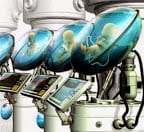As baby-making becomes less about procreation and more about petri dish possibilities, baby-growing appears to be following the trend. In a world where in vitro fertilization has become popularly– accepted despite viewing embryos as commodities at the disposal of their parents (an unfortunate by-product of the abortion mentality), scientists now discuss the not-too-distant possibility of growing babies in artificial wombs. The term for this process, “ectogenesis” (literally, “developing outside”), was first coined by a scientist 90 years ago.
If you’re having flashbacks to your high school reading of Brave New World, you may have deduced that the science fiction author Alduous Huxley was a prophet. And you may be right. Transhumanist futurist Zoltan Istvan projects that the artificial wombs will be in use by around 2045.
Scientists supporting the research have different ends in mind for ectogenesis. Some foresee ectogenesis used for the continued incubation of babies born prematurely. At this point in time, medicine can only help a prematurely-born baby whose lungs have developed enough for survival outside of the womb (somewhere late in the second trimester). Machines can help babies with weak lungs to survive and tothrive, but unless they have achieved a certain stage of development in-utero, medicine remains unable to finish crucial development outside of the womb.
On the other hand, some scientists want these artificial wombs at the disposal of women who cannot carry a child to term naturally. Dr. Helen Hung-Ching Liu, a researcher at Cornell University who has this latter goal in mind, has made strides with the development of an artificial womb. Human embryos have been left at Hung-Ching Liu’s disposal, an ethical problem wholly unrecognized by mainstream media. Instead, that Dr. Hung-Ching Liu grew a human embryo in an artificial womb for ten days. But that embryo was nothing more than a discarded ladder rung in her research.
Istvan posits that ectogenesis will be popularized by those who simply want to avoid pregnancy for personal or safety reasons: “Besides being painful, laborious, and time consuming, giving birth is still medically dangerous to mothers.”
The potential uses of ectogenesis are an ethical and political can of worms. Ectogenesis as a common reality is still far off, but the research being done to advance ectogenesis is highly problematic. As with embryonic stem cell research and in vitro fertilization, which useexisting human children in research and then discard them as no more than dirty beakers, ectogenesis research endangers our unborn children. Pro-Lifers have the responsibility to protect human embryos who may become victims of ectogenesis research.

